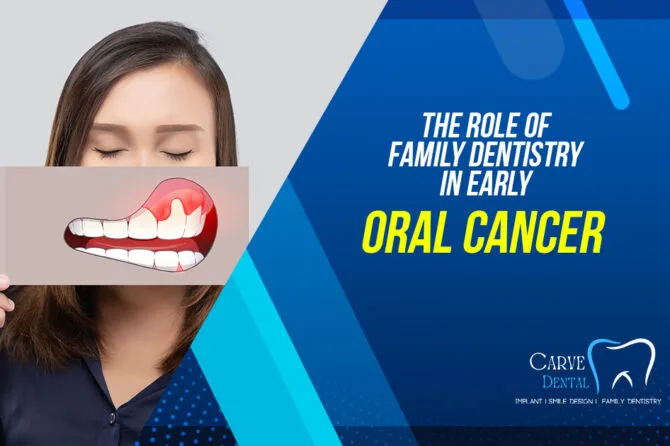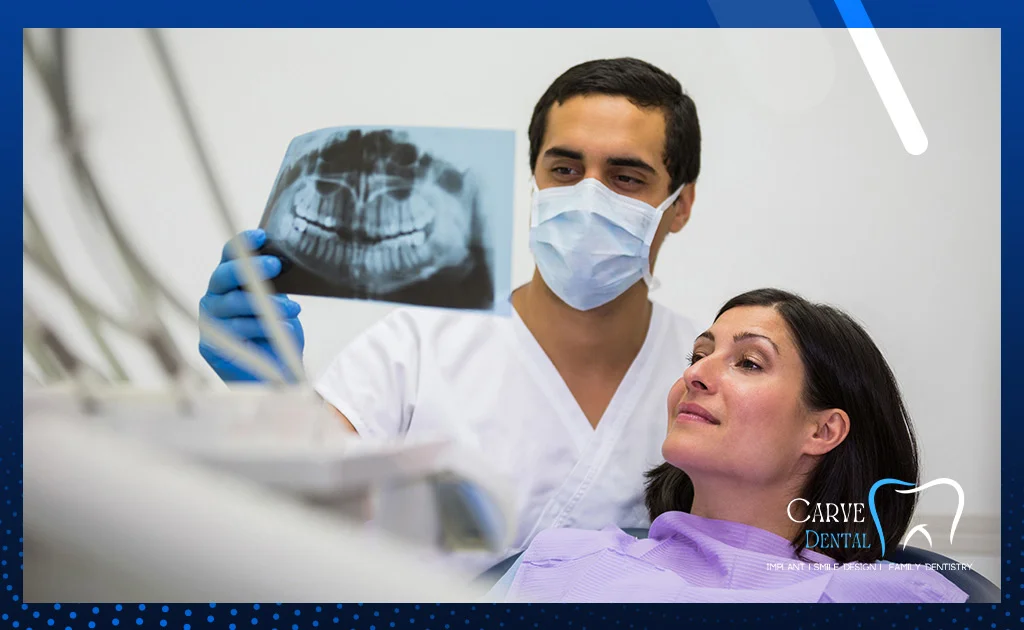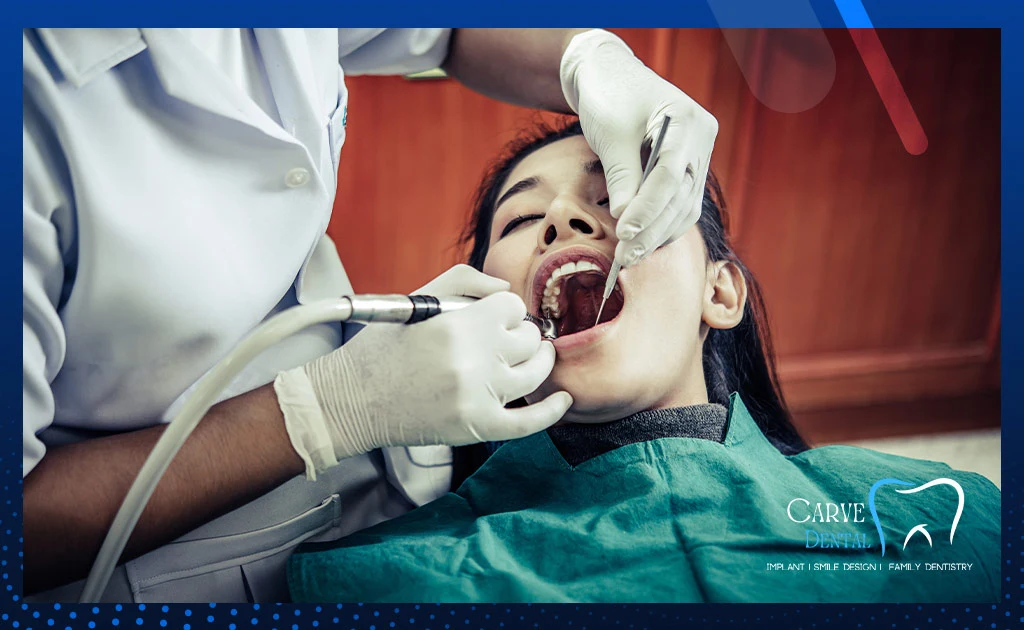
The Role of Family Dentistry in Early Detection of Oral Cancer
Millions of people are suffering from oral cancer diseases in the world at the current time. Timely identification plays a vital role in enhancing treatment effectiveness and increasing chances of survival.
In this blog, you will come to know the overview of oral cancer and the importance of early detection of mouth cancer.
We will dig into the risk factors associated with oral cancer, common signs and symptoms to watch out for, and the pivotal role that family dentists play in detecting oral cancer during routine dental examinations.
Additionally, we will explore the oral cancer screening process, patient education, collaboration with oncology specialists, and advancements in detection technologies.
Understanding Oral Cancer
Mouth cancer is the form of the growth of cells in the oral cavity, and the lips, tongue, cheeks, mouth floor, and throat also are affected by it.
Early detection is crucial for successful treatment outcomes, as advanced-stage oral cancer is associated with a lower survival rate.
By raising awareness about oral cancer and its risk factors, we can empower individuals to recognize the importance of regular screenings and prompt reporting of any concerning symptoms.
Risk Factors for Oral Cancer

Oral cancer occurs due to many reasons and activities, it’s very helpful and important for you to know the risk factors for oral cancer to prevent it.
- Tobacco Use: Engaging in smoking or the use of smokeless tobacco greatly heightens the likelihood of oral cancer occurrence. The noxious chemicals found in tobacco products can inflict damage upon the cells residing in your oral cavity, fostering an environment conducive to the formation of malignant cells.
- Excessive Alcohol Consumption: Heavy alcohol consumption is another significant risk factor for oral cancer. Alcohol can damage and irritate your mouth cells and make them more powerful for cancerous changes.
- HPV Infection: A few strains of HPV, especially HPV-16, and HPV-18 are responsible to increase the mouth cancer risk. Practicing safe sex and getting vaccinated against HPV can help reduce this risk.
- Sun Exposure: Prolonged exposure to the sun, especially without protection, can increase the risk of lip cancer. Using lip balm with a sun protection factor (SPF), wearing wide-brimmed hats, and seeking shade during peak sun hours can help lower this risk.
- Poor Oral Hygiene and Dental Health: Neglecting oral hygiene and failing to address dental issues, such as gum disease or oral infections, can contribute to the development of oral cancer. Maintaining good oral hygiene and visiting your dentist regularly is essential for oral health and cancer prevention.
Being aware of these risk factors and taking proactive measures to reduce your exposure can significantly lower your chances of developing oral cancer.
By making healthier choices and seeking professional dental care, you can protect yourself and promote oral health.
Signs and Symptoms of Oral Cancer
Here are 5 common signs and symptoms of oral cancer that you should not ignore and consult immediately with the dentist.
- Mouth Sores: The development of persistent mouth sores that don’t heal within two weeks is a significant warning sign of oral cancer. These sores may be painless or accompanied by discomfort and can occur on the lips, tongue, or inside the mouth. Regularly inspect your oral cavity for any unusual or long-lasting sores.
- Persistent Mouth Pain: Chronic pain or discomfort in the mouth, including the tongue, gums, or jaw, should not be overlooked. Oral cancer can cause persistent pain that doesn’t subside with time or treatment. If you experience unexplained oral discomfort, it’s essential to consult a dental professional promptly.
- Difficulty Swallowing: Difficulty or pain while swallowing, known as dysphagia, can indicate oral cancer. If you frequently experience discomfort or have trouble swallowing solid foods, it’s crucial to seek medical attention. This symptom may also be accompanied by a sensation of a lump or tightening in the throat.
- Unexplained Oral Bleeding: Any unexplained bleeding in the mouth, such as bleeding gums, tongue, or throat, should be considered a potential sign of oral cancer. Bleeding that persists or recurs without a known cause requires evaluation by a dental or medical professional.
- Hoarseness or Changes in Voice: Oral cancer can affect the throat and vocal cords, leading to hoarseness or changes in voice quality. If you notice persistent hoarseness, a raspy voice, or any significant changes in your voice that don’t resolve within a few weeks, it’s important to get it checked by a healthcare professional.
The Role of Family Dentists in Oral Cancer Detection
Family dentists play a pivotal role in detecting oral cancer during routine dental check-ups.
They have the unique opportunity to visually examine the oral cavity, palpate oral tissues, and identify any abnormalities or suspicious lesions.
Through their expertise, family dentists can detect early signs of oral cancer and promptly refer patients to specialists for further evaluation and diagnosis.
Given that many individuals visit their family dentists regularly, these dental professionals are well-positioned to detect oral cancer at its initial stages, significantly improving treatment outcomes and prognosis.
Oral Cancer Screening
Oral cancer screening is a critical component of routine dental examinations. It involves a comprehensive assessment of the oral cavity using various methods.
The visual examination allows dentists to identify visible abnormalities, while palpation helps detect lumps or irregularities in the oral tissues.
Additionally, adjunctive screening tools like VELscope or oral cancer screening devices may be utilized to enhance detection capabilities.
These tools use specialized lighting or technologies to highlight suspicious areas that may not be visible to the naked eye.
Regular oral cancer screenings are vital for early detection and can greatly increase the chances of successful treatment.

Oral Health History and Risk Assessment
During routine dental visits, family dentists gather comprehensive oral health history and assess lifestyle factors that may contribute to the risk of developing oral cancer.
By understanding patients’ tobacco and alcohol use, HPV infection history, sun exposure, and family medical history, dentists can better evaluate their patients’ risk of developing oral cancer.
This information enables family dentists to tailor their screening and prevention strategies accordingly. Moreover, dentists can educate patients about the importance of maintaining good oral hygiene, regular dental visits, and adopting healthy habits to reduce the risk of oral cancer.
By fostering a collaborative relationship with patients, family dentists can provide personalized care and empower individuals to take charge of their oral health.
Patient Education on Oral Cancer Awareness
Raising awareness about oral cancer is essential for early detection and prevention.
Family dentists play a vital role in educating their patients about the risk factors, signs, and symptoms of oral cancer.
Through brochures, informational materials, and face-to-face discussions, dentists can provide valuable knowledge to their patients.
They emphasize the importance of regular dental visits for early detection, self-examinations at home, and seeking prompt medical attention for any concerning symptoms.
Patient education also includes promoting healthy lifestyle choices, such as smoking cessation, moderation of alcohol consumption, practicing safe sex, and maintaining proper sun protection.
By empowering patients with the necessary information, family dentists contribute to oral cancer prevention and help individuals make informed decisions about their oral health.
Collaboration with Oncology Specialists
When oral cancer is diagnosed or suspected, a collaborative effort between family dentists and oncology specialists is crucial to ensure comprehensive care for the patient.
Family dentists refer patients to oncology specialists for further evaluation, diagnosis, and treatment planning.
This collaboration allows for a multidisciplinary approach, where dental and medical professionals work together to provide the best possible care.
Oncology specialists conduct further tests, such as biopsies and imaging studies, to confirm the diagnosis and determine the extent of the disease. They develop personalized treatment plans, which may include surgery, radiation therapy, chemotherapy, or a combination of these approaches.
Throughout the treatment process, family dentists collaborate with oncology specialists to manage oral health complications and ensure optimal oral care for patients.
Follow-up and Referral Process
When family dentists detect suspicious lesions or symptoms during oral cancer screenings, they follow a structured follow-up and referral process.
If abnormalities are identified, family dentists promptly refer patients to oncology specialists or oral and maxillofacial surgeons for further evaluation and diagnosis.
Timely referrals are essential to ensure that patients receive the appropriate care and undergo the necessary tests to confirm or rule out oral cancer.
Family dentists communicate their findings and provide all relevant information to the referred specialists, including detailed notes, images, and any relevant medical history.
This seamless transfer of information facilitates a streamlined evaluation process and ensures that patients receive prompt attention from the appropriate healthcare professionals.
Family dentists also play a crucial role in the follow-up care of patients diagnosed with oral cancer.
They work closely with the oncology specialists to monitor the patient’s oral health during and after treatment, addressing any oral complications and providing supportive care.
This collaborative approach between family dentists and specialists ensures comprehensive and coordinated care, resulting in better treatment outcomes and improved quality of life for patients.

Advancements in Oral Cancer Detection
Emerging technologies are revolutionizing the field of oral cancer detection, offering new possibilities for early diagnosis and improved outcomes.
Fluorescence-based imaging techniques, such as VELscope, use specialized light to detect abnormal tissues that may be indicative of oral cancer.
These technologies enhance the visualization of suspicious areas, aiding in early detection and reducing the need for invasive procedures.
Another promising advancement is the use of salivary biomarkers, which involve analyzing saliva samples for specific molecules associated with oral cancer.
Salivary biomarker testing holds the potential for non-invasive and cost-effective oral cancer screening, enabling early detection and monitoring of the disease.
As these technologies continue to evolve and become more accessible, family dentists can incorporate them into their practice, enhancing their ability to detect oral cancer at its earliest stages and provide timely interventions.
Conclusion
Understanding oral cancer, its risk factors, and the importance of early detection is crucial for promoting oral health and reducing the burden of this disease.
Family dentists play a critical role in oral cancer detection through routine screenings, patient education, and collaboration with oncology specialists.
By staying informed about advancements in detection technologies and incorporating them into their practice, family dentists can further enhance their ability to identify oral cancer at an early stage.
You should keep a proactive approach considering regular dental visits, self-examinations, and awareness of the symptoms.
Alertness and awareness of your oral health and regular dental check-up will stay you away from oral cancer and all related diseases.
FAQs
How Can Family Dentistry Contribute to The Early Detection of Oral Cancer?
Family dentistry aids early oral cancer detection through routine examinations and referral of suspicious areas.
What Are The Common Signs And Symptoms of Oral Cancer That Family Dentists Look For?
Signs include persistent sores, patches, bleeding, difficulty swallowing, and changes in oral tissues.
How Often Should I Visit a Family Dentist For Oral Cancer Screenings?
Visit a family dentist every six months for oral cancer screenings, adjusted based on individual risk factors.
What Happens If a Family Dentist Suspects Oral Cancer During an Examination?
If oral cancer is suspected, further tests and referral to a specialist will be recommended.
Can Family Dentistry Help Prevent Oral Cancer?
Family dentistry promotes prevention through oral hygiene, healthy habits, and discouraging tobacco and alcohol use.
Leave a reply
Leave a reply